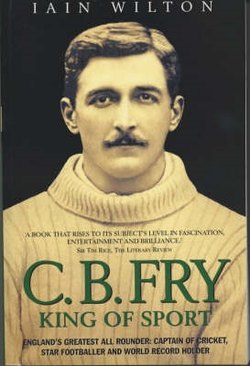Читать книгу CB Fry: King Of Sport - England's Greatest All Rounder; Captain of Cricket, Star Footballer and World Record Holder - Iain Wilton - Страница 6
На сайте Литреса книга снята с продажи.
INTRODUCTION
ОглавлениеIt is hard to know when my awareness of C.B. Fry really began. As a cricket-loving boy, I was given a piece of paper bearing his signature; a couple of cigarette cards, with rather poor likenesses of his face, followed soon afterwards; and, as I grew older, I was told how my grandfather had come across him on two occasions – once in the early 1900s (at The Dell) and again, almost half a century later, in the grounds of a school by the New Forest. Eventually, realising that I was an incurable sports fan, my brother gave me Fry’s autobiography, Life Worth Living, in the mid-1980s. At the time, my interest in cricket went back no further than the 1970s. I had little interest in long-dead batsmen whose photographs were as likely to be in sepia as black-and-white. For 10 years the book remained unopened. Finally, however, I picked it up and found, to my delight, that it was a beautifully written book, which told an extraordinary life-story. No sooner had I read it than I wanted to discover more about this remarkable man. There would, I thought, be plenty of books about him. After all, biographies of W.G. Grace seem to have been produced by the dozen. To my surprise, however, I found that writers had yet to give Fry’s life the attention that it deserved. A hagiography, C.B. Fry: The Man and His Methods by Arthur Wallis Myers, had appeared in 1912, when its subject was barely 40. Denzil Batchelor wrote a 60-page sketch of Fry in the early 1950s but, as a close friend, he gave an equally unbalanced account of a life which had yet to end. Eventually, I discovered that only one full-length biography of Fry had ever been published – Clive Ellis’s C.B.: The Life of Charles Burgess Fry. The book is a good one but I had a nagging suspicion that certain aspects of his life had been ignored and others could have been covered in greater depth. Why was he invited to meet Hitler? Were the stories of his mental illness really true? And what were his reasons for choosing such an unusual wife? These were just some of the questions which remained largely unanswered.
After reading about his wife’s extraordinary background in Ronald Morris’s revelatory, The Captain’s Lady, I felt sure there was enough fresh material to warrant another biography of Fry himself. However, any publisher would probably need to find some kind of ‘hook’ before deciding to produce it. The 125th anniversary of his birth had passed; the 50th anniversary of his death was still some time away; but then I realised that the centenary of his official Test début – in 1899 – was imminent. The time was surely right, therefore, for someone to write a new biography of Fry. I considered whether I should give it a try. My initial reaction was sceptical. To get the hardback published in time, I would need to resign from the BBC and spend all my time researching and writing it. Financially, it made no sense at all. Moreover, I had never written anything longer than a lecture. But the idea wouldn’t go away. I couldn’t hope to find a more intriguing subject. If I didn’t write the book, someone else surely would. So, eventually, I took the plunge.
Fortunately, I soon discovered plenty of new material. Previous writers had made mistakes about Fry’s family background – from the number of his sisters to the age of his brother and wife. Many of the claims in Life Worth Living proved unfounded and some eminent cricket-writers had clearly repeated – uncritically – several of Fry’s taller tales. Above all, however, the cooperation of his descendants meant that I could cast new light on Fry’s private life, including his marriage and his mental health, and make a balanced assessment of this highly complex character.
In the course of my research I was also fortunate to uncover plenty of unusual information, including his grandfather’s unorthodox approach to electioneering, Fry’s stint as a nude model and the time when he was, apparently, contacted from beyond the grave. Then there are the larger-than-life characters – including a 21-stone England goalkeeper, a sportsman who went looking for the lost ark of the covenant and the Hollywood star who made his fortune playing Frankenstein’s monster but much preferred playing cricket.
Such stories and characters made the writing of this book more engrossing than I could have expected. I am delighted that they have also played their part in persuading Metro to produce it in paperback form.
Like its predecessor, this version is being published at a very appropriate time. While the hardback helped to celebrate the centenary of Fry’s official Test début, this paperback has been timed to mark the centenary of C.B.’s appearance in the F.A. Cup Final.
His sporting record was clearly remarkable. However, sport forms just one part of Fry’s life-story. It was truly, by any standards, a life worth living
